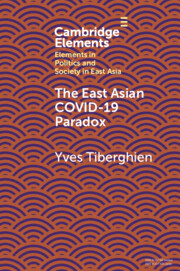References
Akamatsu, K (1962) A historical pattern of economic growth in developing countries. Journal of Developing Economies 1(1): 3–25.
Aldrich, D and Yoshida, T (2020) How Japan stumbled into a pandemic miracle. Current History 119: 217–221.
Arnold, C (2018) Pandemic 1918: Eyewitness Accounts from the Greatest Medical Holocaust in Modern History. New York: St Martin’s Press.
Barrett, S (2007) Why Cooperate? The Incentive to Supply Global Public Goods. Oxford; New York: Oxford University Press.
Berman, P (2020) Upstream Drivers of Effective Pandemic Response: An Initiative at UBC to Learn How to Better Engage the Institutional, Organizational, Governance, and Political Factors that Determine Success. Vancouver: University of British Columbia.
Calder, KE (2019) Super Continent: The Logic of Eurasian Integration. Stanford, CA: Stanford University Press.
Calder, KE and Fukuyama, F (2008) East Asian Multilateralism: Prospects for Regional Stability. Baltimore, MD: Johns Hopkins University Press.
Calder, KE and Ye, M (2010) The Making of Northeast Asia. Stanford, CA: Stanford University Press.
Christakis, NA (2020) Apollo’s Arrow: The Profound and Enduring Impact of Coronavirus on the Way We Live. New York: Little, Brown Spark.
Drezner, DW (2014) The System Worked: How the World Stopped Another Great Depression. Oxford: Oxford University Press.
Elliott, DSP and Poth, J (1983) Saltwater People: A Resource Book for the Saanich Native Studies Program. Saanich, BC: Saanich School District.
Emmerson, DK (2020) The Deer and the Dragon: Southeast Asia and China in the 21st Century. Stanford, CA: Walter H. Shorenstein Asia-Pacific Research Center.
Esarey, A, Haddad, MA, Lewis, JI, and Harrell, S (2020) Greening East Asia: the Rise of the Eco-Developmental State. Seattle: University of Washington Press.
Farrell, H and Newman, AL (2019) Weaponized interdependence: How global economic networks shape state coercion. International Security 44(1): 42–79.
Gerschenkron, A (1962) Economic Backwardness in Historical Perspective. Cambridge, MA: Belknap Press.
Hale, T, Webster, S, Petherick, A, et al. (2020) Oxford COVID-19 Government Response Tracker. Oxford: Blavatnik School of Government.
Hiebert, M (2020b) Under Beijing’s Shadow: Southeast Asia’s China Challenge. Lanham, MD; Boulder, CO; New York; London: Rowman & Littlefield.
Horton, R (2020) The COVID-19 Catastrophe: What’s Gone Wrong and How to Stop It Happening Again. Cambridge, UK; Medford, MA: Polity Press.
Ikenberry, GJ (2011) Liberal Leviathan: The Origins, Crisis, and Transformation of the American World Order. Princeton, NJ: Princeton University Press.
Ikenberry, GJ (2018) The end of liberal international order? International Affairs 41(1): 7–23.
Johnson, CA (1982) MITI and the Japanese Miracle: The Growth of Industrial Policy, 1925–1975. Stanford, CA: Stanford University Press.
Kagan, R (2018) The Jungle Grows Back: America and Our Imperiled World. New York: Alfred A. Knopf.
Kahneman, D (2011) Thinking, Fast and Slow. Toronto: Doubleday Canada.
Katzenstein, PJ and Shiraishi, T (1997) Network Power: Japan and Asia. Ithaca, NY: Cornell University Press.
Khanna, P (2019) The Future Is Asian: Commerce, Conflict, and Culture in the 21st Century. New York: Simon & Schuster.
Khong, YF and Nesadurai, HES (2007) Hanging together, institutional design, and cooperation in South East Asia: AFTA and the ARF. In Acharya, A and Johnston, AI (eds), Crafting Cooperation: Regional International Institutions in Comparative Perspective, pp. 32–82. New York: Cambridge University Press.
Kuik, C-C (2008) The essence of hedging: Malaysia and Singapore’s response to a rising China. Contemporary Southeast Asia 30(2): 159–185.
Lee, Y (2020) South Korea. In Tworek, H, Beacock, I, and Ojo, E (eds), Democratic Health Communications during COVID-19: A RAPID Response. Vancouver: SPPGA (UBC).
Liu, Z, Ciais, P, Deng, Z, et al. (2020) Near-real-time monitoring of global CO2 emissions reveals the effects of the COVID-19 pandemic. Nature Communications 11(1): article number 5172.
Mackenzie, D (2020) COVID-19: The Pandemic that Never Should Have Happened and How to Stop the Next One. New York: Hachette.
Mahbubani, K and Sng, J (2017) The ASEAN Miracle: A Catalyst for Peace. Singapore: National University of Singapore Press.
Nayyar, D (2019) Resurgent Asia: Diversity in Development. Oxford: Oxford University Press.
Okimoto, D (1989) Between MITI and the Market. Stanford, CA: Stanford University Press.
Osterholm, MT and Olshaker, M (2017) Deadliest Enemy: Our War Against Killer Germs. New York: Little, Brown and Company.
Osterholm, MT and Olshaker, M (2020) Deadliest Enemy: Our War Against Killer Germs (2020 Edition). New York: Little, Brown and Company.
Ostwald, K and Myint, T (2020) COVID in Myanmar – IDRC Newsletter.
Pempel, TJ (2005) Remapping East Asia: The Construction of a Region. Ithaca, NY: Cornell University Press.
Quick, JD (2018) The End of Epidemics: The Looming Threat to Humanity and How to Stop It. New York: St Martin’s Press.
Rudd, K (2020) The coming post-COVID anarchy: The pandemic bodes ill for both American and Chinese power – and for the global order. Foreign Affairs (May 6).
Schmitter, PC (2005) Ernst B. Haas and the legacy of neofunctionalism. Journal of European Public Policy 12(2): 255–272.
Shimizu, K, Wharton, G, Sakamoto, H, et al. (2020) Resurgence of COVID-19 in Japan. BMJ 370: m3221.
Strangio, S (2020) In the Dragon’s Shadow: Southeast Asia in the Chinese Century. New Haven, CT; London: Yale University Press.
Taylor, S (2019) The Psychology of Pandemics: Preparing for the Next Global Outbreak of Infectious Disease. Cambridge: Cambridge Scholars Publishing.
Tiberghien, Y (2007) Entrepreneurial States: Reforming Corporate Governance in France, Japan, and Korea. Ithaca, NY: Cornell University Press.
Tiberghien, Y (2020) Asia’s rise and the transition to a post-Western global order. In Chu, Y-H and Zheng, Y (eds), Contending Views on the Decline of Western-centric World and the Emerging Global Order in the 21st Century, pp. 357–378. London: Routledge.
Tooze, A (2018) Crashed: How a Decade of Financial Crises Changed the World. New York: Viking.
Vogel, EF (2011) Deng Xiaoping and the Transformation of China. Cambridge, MA: Harvard University Press.
Wade, R (1990) Governing the Market. Princeton, NJ: Princeton University Press.
World Bank (1993) The East Asian Miracle. Oxford: Oxford University Press.
Zakaria, F (2020) Ten Lessons for a Post-Pandemic World. New York: W.W. Norton & Company.
Zhou, P and Shi, Z-L (2021) SARS-CoV-2 spillover events. Science 371(6525): 120.



